Biggest fall in HGV drivers among the middle-aged
- Published
- comments
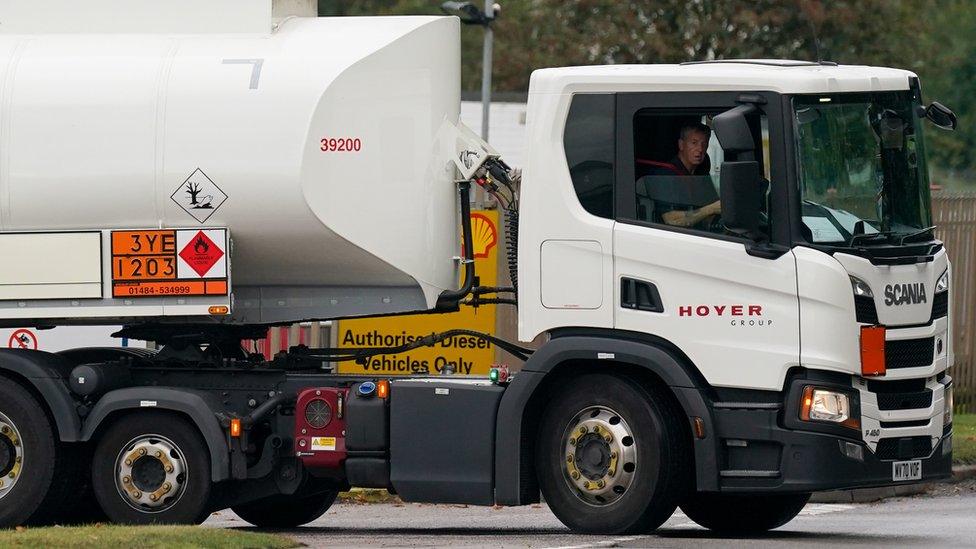
The biggest fall among HGV drivers in recent years has been among middle-aged workers, according to official figures.
The Office for National Statistics (ONS) says the number of HGV drivers in the UK peaked in 2017 and the largest fall since has been among those aged 46 to 55 years.
The shortage of HGV drivers has led to widely-reported delivery problems for food, fuel and other items.
Both Covid and Brexit have also been blamed as factors behind the shortage.
In June 2017, there were 321,000 people working as HGV drivers in the UK, according to the ONS. But that number had dropped by 53,000, or 17%, to 268,000 by June 2021.
It also disclosed that while there were 12,000 fewer EU nationals driving HGVs, the number of UK nationals had fallen by 42,000.
By June 2021 there were 34,000, or 29%, fewer drivers in the 46-55 age group.
Nearly a third of all drivers in the UK were aged 56 or over in 2020-21, with just under 20% aged between 19 and 35, the figures show.
Haulage companies say they want more to be done to attract younger workers.
That includes better terms and conditions, better facilities for long distance drivers to use, and a recognition that they are a vital part of the economy.
The Road Haulage Association (RHA) said that the number of drivers retiring was the main reason for the current shortage.
They also blamed Brexit and changes to off-payroll working rules, known as IR35.
Rod McKenzie, managing director of policy and public affairs at the RHA, said problems worsened during lockdown as "many drivers who were furloughed in non-essential sectors like retail decided to move into other jobs and they have not returned".
But he told the BBC experienced older drivers have been put off returning to the industry because of the need to undertake extensive extra training, including 35 hours of vocational training.
"The government's recent letter asking for drivers to come back into haulage has not been welcomed by many retired drivers who see the classroom-based training (known as Driver CPC) as a barrier to coming back," he said.
The RHA has suggested reforms to Driver CPC to shorten the classroom training part of coming back into the industry.
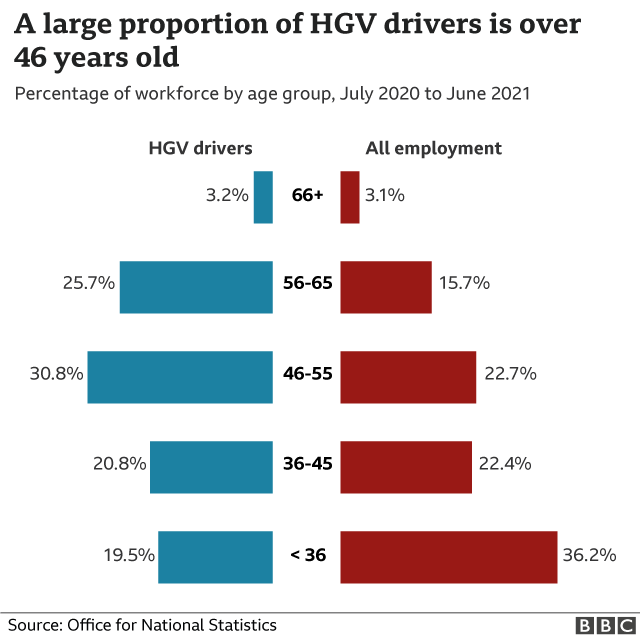

'I wouldn't be a lorry driver and I own a logistics business'
Seeing one of his drivers being constantly verbally abused while they were on the road together was the last straw for Paul Carter, managing director of Certa Logistics.

His drivers move food products around the UK and Europe for a top supermarket and High Street coffee chains.
It's a job, he says, that's not made easy by the lack of basic facilities and public consideration, which he believes has degenerated over his 30-year career.
Taking to social media, Mr Carter wrote that the country needs to revolutionise how it treats and views HGV drivers.
"Regardless of how much money you earn, who in their right mind would want to come to work to be treated and spoken like this just trying to carry out a day's work?
"I wouldn't be a lorry driver and I own a logistics business."
While the shortage of drivers has pushed pay up, Mr Carter says the issue is more fundamental, coming back to the conditions that drivers experience.
Increasing pay is just seeing more people move around the sector into the big players, he says, rather than increasing the number of people willing to do the work.

Transport Secretary Grant Shapps said the driver shortage has been exacerbated by the coronavirus pandemic but added: "There are longer-term issues surrounding attracting and retaining drivers to the industry such as anti-social hours, poor diversity, relatively low pay and poor driver facilities."
The impact of the coronavirus crisis on testing was shown by the ONS data which revealed there were just 16,022 HGV test passes in the last year, compared with an average of 41,731 a year over the previous five-year period.
Mr Shapps confirmed on Monday legislation to streamline the HGV driving licence regime to cut the red-tape needed to qualify as a driver.
"Tackling the causes and effects of the HGV driver shortage is a top priority for my department," he said.
The government has also recently allowed temporary visas for EU lorry drivers in an attempt to address the shortage.
However, the government measures yet to take effect, Mr McKenzie told MPs on Tuesday.
"There are widespread shortages of lorry drivers which are leading to delays and frustrated trips. Things are not visibly getting better at this stage," he told the business select committee.
"We think it's going to be a year to recover from where we are," he said.
An RHA survey of its members estimated there is now a shortage of more than 100,000 qualified drivers in the UK.

Julia Kermode says we need to appreciate HGV drivers more
We need to change our perception of the haulier industry if we want to stop experienced drivers leaving the profession, reckons Julia Kermode of Nantwich-based IWork, which represents independent workers.
"HGV drivers are forced to contend with many restrictions on where and when they can stop and have to pay for the privilege of resting after a hard day's work, often in places with poor facilities.," she said.
"They also have to deal with the fact that a lot of people don't want to see lorries and lorry drivers in their everyday lives."
She added that on top of that, pay has been squeezed and self-employed drivers' income has been severely reduced by off-payroll tax legislation, so it is not surprising that many hauliers feel it simply is not worth it anymore.
"The irony is that we are completely reliant on HGV drivers for our daily lives and it's about time we all realised that and appreciated them for what they do."
Related topics
- Published15 October 2021
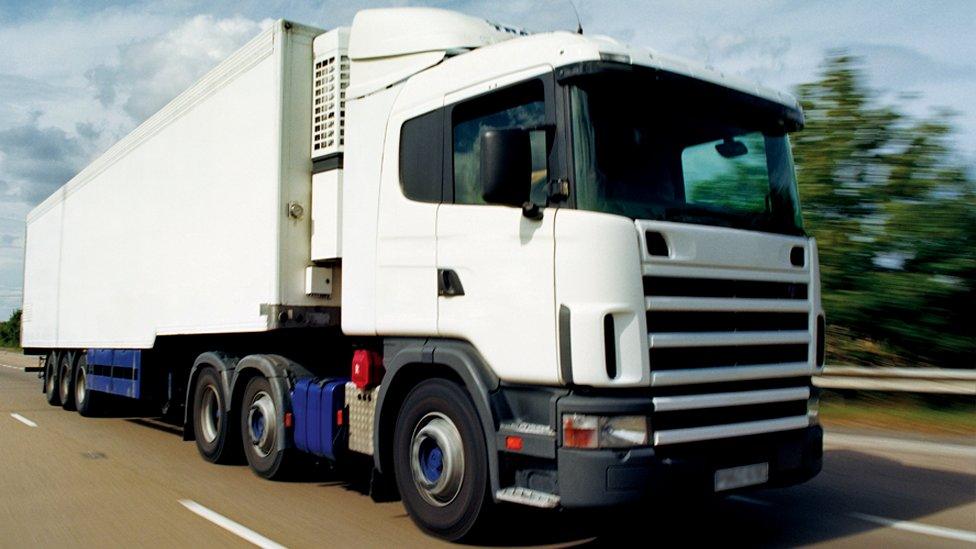
- Published15 October 2021
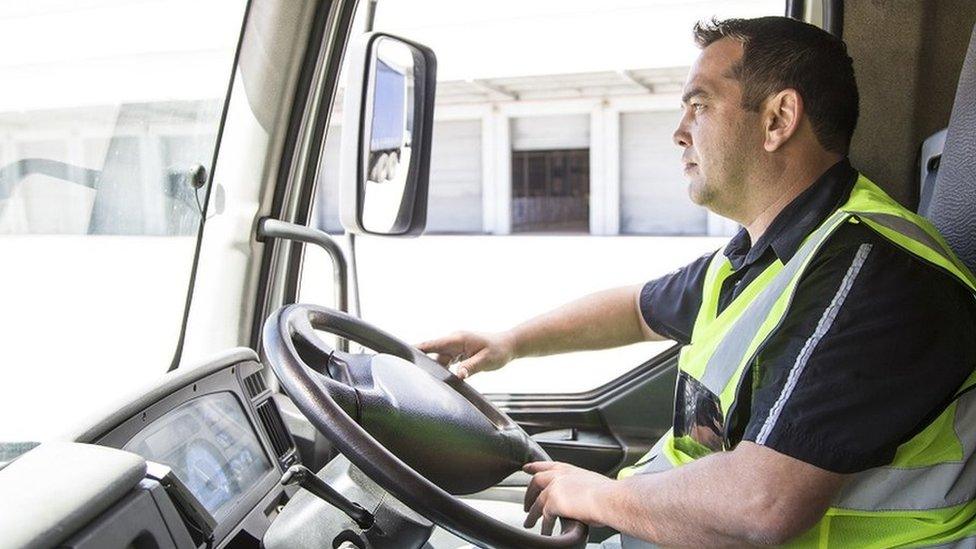
- Published15 October 2021
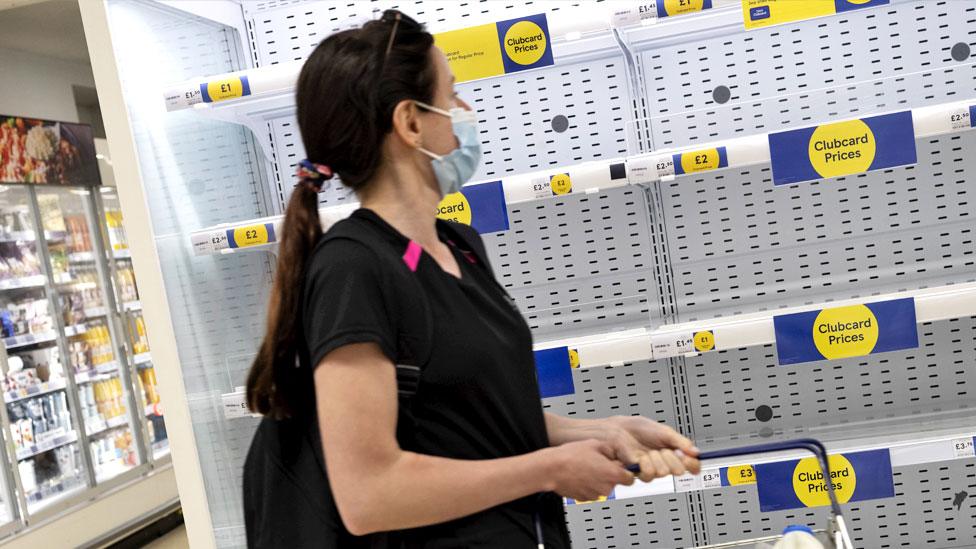
- Published14 October 2021

- Published14 October 2021
